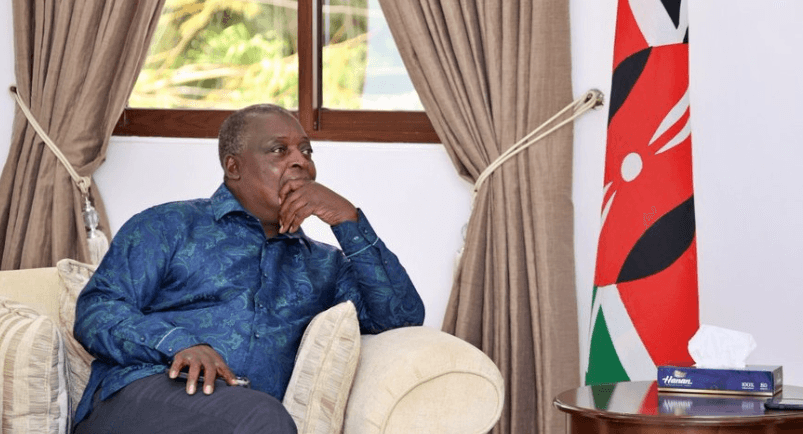Generals and writers never die or hang their boots; they live on through their legacy and disciples who perpetuate their ideologies and aesthetic vision of societies. Kenya Literature Scholars, a network of 400 dons and scribes of the literary and performing arts in Kenya, has established a robust tradition in this direction.
This social media group, birthed during the Covid-19 pandemic, operates as a social media outfit that consolidates the book culture and literary heritage of Kenya today. It unites media, film, literature, folklore and theatre scholars, scribes and enthusiasts under the leadership of Dr GO Nyandoro of Kisii University and me.
An associate of the Creative Writers Association of Kenya (CWAK), led by Prof Egara Kabaji, this network last week journeyed to Vihiga county on Saturday to celebrate Arthur Luvai, a revered poet and emeritus Professor of Literature at Maseno University. At 77, Luvai is now an agripreneur on his modern farm in Chango.
Our delegation of prominent Kenyan literati was led by Prof Peter Amuka and Prof P Simatei. It included: EO Mugarizi, Adalo Moga, Jane Bwonya, John Midega and others. The purpose of the surprise visit was to honour Luvai’s immense contributions to literature and celebrate his life’s work. The air was filled with the warm embrace of camaraderie as old friends and colleagues gathered to pay their respects to this living literary giant.
The celebration climaxed into a half a day of exalted recitations and energetic performances. Jonathan Muga, a Kiswahili don at Maseno University, the hero’s last workstation, did a shairi for Luvai. Eloquent Midega, a former colleague, performed a Luo Pakruok, sending the gathering of bibliophiles into a frenzy.
Deborah Namukoa and Jane Bwonya, both from Maseno University, added to the occasion with recitations in Kiswahili and English as Mugarizi presented a golden placard to the old poet as he serenaded him with a recital of Luvai’s famous poem, ‘Ringless Freedom’, resonating with the current mood of the country.
For many attendees, the visit was a nostalgic journey back to their days as students under Luvai’s tutelage. Prof Peter Amuka recalled how Luvai demystified the complex poetry of Wole Soyinka and Christopher Okigbo, making it accessible and enjoyable in his undergraduate days at the UoN in the early 1970s. “He had the key to unlock the secrets of Ogun in Soyinka’s poems,” Amuka reminisced.
Luvai’s legacy is a rich narrative woven with the lives of his notable mentees and students, who carry his literary torch forward. They include Prof Oluoch Obura of Kenyatta University, the Vice Chancellor of the Presbyterian University of East Africa, Prof Wangari Mwai, Prof Peter Simatei of Moi University alongside Dr VO Ouno of Pwani University.
From the halls of the University of Pretoria in South Africa, Prof James Ogude echoes Luvai’s teachings, as does Prof Ndigirigi Gichingiri at the University of Tennessee. These high achievers in literary and theatre arts, his ex-students abroad, bear testament to Luvai’s profound influence.
In between tintinnabulational tunes of Luhya isukuti players and under a bright sun and singing sparrows, the old bard’s visitors reflected anew upon his significant literary works.
Some were produced with others, including the pioneer Kenyan anthology of poems, Boundless Voices (1988), the short story and prose admixture Tender Memories (1989) and the 258-pages Echoes Across the Valley (2000), which he co-edited with Kwamchetsi Makokha. These collections have left an indelible mark on Kenyan literature, serving as a beacon for aspiring poets and scholars.
Despite his retirement from academia, Luvai remains active and engaged as his images here show. He has transitioned to a new role as a commercial farmer and agripreneur. His farm, a living evidence of his enduring hard work ethic and poetic passion for a pristine nature, is set to become one of the most modern dairy farms in Maragoli.
During the visit, the guests toured the ambitious dairy project, which aims to house a herd of 80 cattle. Luvai’s enthusiasm for farming is matched only by his love for literature and music. Upon arrival, he welcomed the visitors with a song, playing his fading keyboard with the same passion that he once brought to the lecture halls for thousands of his students to enjoy over a career of four decades.
Luvai’s personal journey is as inspiring as his professional achievements. He did not major in literature as an undergraduate but was drawn into the field by a fortuitous encounter during a paper presentation. His academic career blossomed under the mentorship of esteemed scholars of the revolutionary late 1960s and 1970s, in the wake of the decolonisation of the colonial English university curriculum at UoN.
Those who taught him and his contemporaries, including the late publishing guru Henry Chakava, are famous professors such as Angus Calder, Ngugi wa Thiong’o and David Cook. Though he did not pursue a PhD, Luvai rose to become a chairman, a professor and a deputy vice chancellor at Maseno University due to his undeniable impact on the Kenyan literary world.
His wife, Regina Luvai, a retired primary school teacher, stood by his side throughout his career and continues to support his endeavours. Their story teaches all the power of dedication and partnership in achieving great things.
The cheerful don’s devotion to poetry, his abiding forte, is encapsulated in his belief that “poetry is the second aspect of nature, the first one being divinity”. This philosophical insight offers a profound lesson: just as nature and divinity are intertwined, so, too, is poetry woven into the very fabric of our existence, illuminating the divine beauty within the mundane and inspiring us to see beyond the ordinary to the sacred essence of life.
Prof Arthur Imbwani Luvai’s literary legacy is enshrined in his influential publications, which have become essential nuggets in the teaching of literature at both secondary and tertiary levels of education in Kenya, Tanzania and beyond. His works are now canonical in the poetic heritage of the Eastern African literary landscape.















